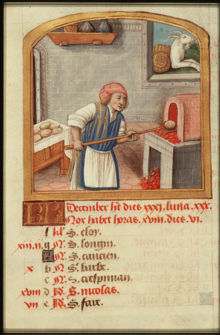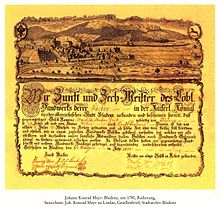baker
The baker is a person who makes a living baking bread , rolls , biscuits and fine baked goods . Baker is a craft and training occupation . A workplace set up to practice this profession is called a bakery .
Differentiation between baker and confectioner
The job title baker is sometimes used colloquially for the profession of confectioner ( confectioner ). Confectioners, however, specialize in sweet goods and do not make bread products. In Germany and Austria there are also separate professions for which different journeyman examinations have to be taken. Many bakeries also produce products that are part of the confectioner's trade. Bakers who have learned or worked in such bakeries are referred to as "bakers with pastry experience".
history

The patron saint of bakers is St. Nicholas of Myra .
The craft of the baker used to be divided into
- Confectioner ( confectioner )
- Gingerbread baker ( gingerbread )
- Los or white bakers ( wheat bread , rolls, etc.)
- Fast or black baker ( rye bread )
These distinctions were first abolished in Prussia in 1752, as they led to constant friction, also to the detriment of customers. The baker's profession was one of the free, free, and open crafts. The authority of a master to bake was called the (baking) justice or also the bank . As early as Roman law , the bakers were united into their own corporations, and in the Middle Ages the formation of bakers' guilds was promoted through the granting of privileges . However, their rights were accompanied by certain obligations. The bakers were supposed to help prevent general emergencies by providing a constant supply of flour.
In Paris and in some French departments the bakers were united in closed corporations under the direction of syndicates in 1801 . Authorization was then required for operation. The purpose of a special bakery fund was to equalize the price of bread by making advances to the bakers in expensive times. This facility existed until 1863.
The German trade regulations finally released the bakery trade. According to Section 73, however, bakers could be encouraged to make the public aware of the price and weight of their goods at the shop.
The baked goods were traditionally sold in the shops of the master bakers, who were run as a family business. These bakeries obtained the flour from the local millers . With industrialization, more and more large bakeries emerged which, in addition to fresh baked goods, also produced frozen dough pieces in so-called baking lines. Initially intended as an expansion of the range, the local bakeries took over the baking and sale of these dough pieces alongside products from their own production. At the same time, these baked goods were increasingly being offered as finished products in supermarkets and petrol stations. Due to the increasing price pressure , caused by a lot of competition , many traditional bakers had to give up their operations or were taken over by chain stores in the last few decades. In the suburbs, train stations and large shopping centers, discounters have recently established themselves , which bake frozen dough pieces in the sales room .
Initial and continuing education
Germany
After a mostly three-year dual training in the bakery trade, the journeyman's examination is taken in front of the regional guild. Immediately afterwards, the journeyman baker has the opportunity to continue his education at a technical school and then take the master craftsman's examination in front of the Chamber of Crafts . This training can be done in a master's school (e.g. Akademie Deutsches Bäckerhandwerk Weinheim (Federal College), Bakery College Hanover , Saxon Bakery College Dresden-Helmsdorf , First German Bakery College Olpe, Academy Bavarian Bakery Crafts Lochham ) or at the local guild. The previously required five-year apprenticeship as a requirement for admission to the master craftsman examination has been dropped. After successfully completing the master craftsman's examination, you acquire the right to practice the profession of baker independently and to train trainees in this profession.
The training allowance in Germany is around € 615 in the first year of training, around € 700 in the second year and around € 820 in the third year of training.
Austria
In Austria, the apprentice is trained for three years in the dual system at vocational schools and in craft businesses (bakeries) or in industrial companies and at the end takes the final apprenticeship examination. The related apprenticeship, confectioner, can be completed with a shortened apprenticeship period and after completing the apprenticeship, further training to become a master can follow. In contrast to Germany, a master craftsman's examination is not absolutely necessary for a trade license, the final apprenticeship examination and a three-year relevant professional activity are sufficient for this.
Switzerland
France
In France, too, there is training (apprentissage) to become a baker (French Boulanger).
The training is a bit narrower than in Germany and Switzerland, the baker literally "only" bakes baguettes and other breads, but no croissants, for example (the confectioner is responsible for this). But there are already over twenty different types of baguette , some of which differ significantly in terms of dough and baking process.
Individual evidence
- ↑ Alexander Krex: It's dead serious time online , April 26, 2020, accessed on May 2, 2020
- ^ Text of the ordinance on professional training as a baker
- ↑ Apprenticeship as a baker | Online = https://www.deutsche-handwerks-zeitung.de/halt-baecker-azubis-ausbildung/150/32556/374598
- ↑ Apprenticeship Ordinance Apprenticeship Austria ( Memento from January 23, 2013 in the Internet Archive ) (PDF file; 214 kB) valid since July 2010
- ↑ Federal Law Gazette II No. 28/2003 : Trade Access Ordinance of the Austrian Ministry of Economics, valid since 2003
- ↑ http://www.hajen.de/bilder/ausch.pdf
See also
- Bakery trade , confectioner
- Bäckerschupfen - penalty for pastries that are too small
Web links
- Central association of the German bakery trade
- Information on training as a baker and bakery salesman
- The website of the Swiss Association of Master Bakers and Confectioners
- Information about the Austrian Bakers' Guild of Austrian Bakers
- Job description and employment figures of the German bakers
- Professional and industry information from the Austrian Chamber of Commerce
- Detailed training and further education information for Austria from the Institute for Economic Research: BerufsInformationsComputer (BIC)


